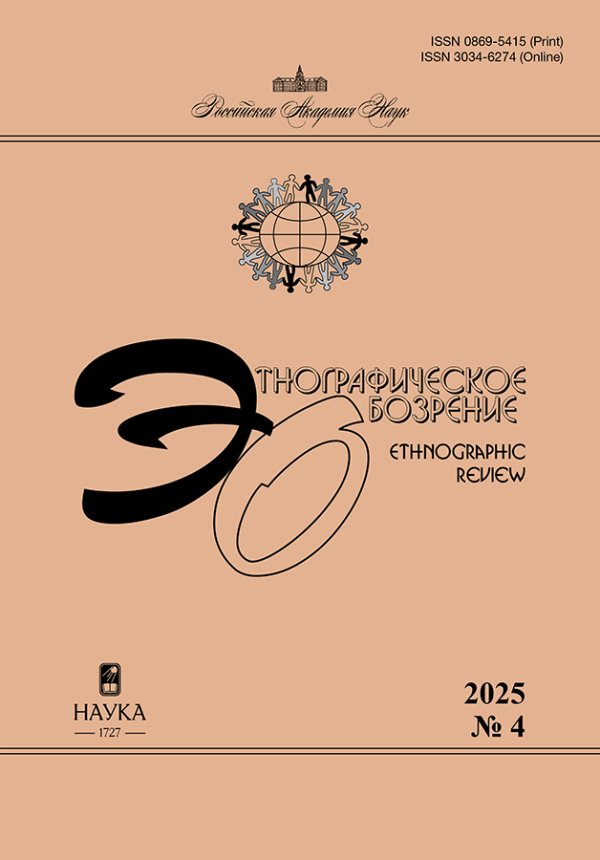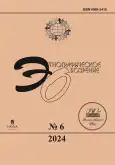Дивид на заимке, заимка как дивид: этнография сибирской избушки сквозь призму женского отсутствия
- Авторы: Рахманова Л.Я.1
-
Учреждения:
- Национальный исследовательский университет “Высшая школа экономики” в Санкт-Петербурге
- Выпуск: № 6 (2024)
- Страницы: 41-65
- Раздел: Специальная тема номера: Экономическая антропология домохозяйства современной России за пределами мегаполисов
- URL: https://gynecology.orscience.ru/0869-5415/article/view/672366
- DOI: https://doi.org/10.31857/S0869541524060035
- EDN: https://elibrary.ru/VTYQAU
- ID: 672366
Цитировать
Полный текст
Аннотация
Статья этнографически ставит вопрос о том, каким образом таежные и речные избушки и заимки Среднего Приобья, существующие в своих ритмах параллельно с сельскими и городскими формами жизни, трансформируют гендерные роли и качества, не укладываясь в представления о должном поведении и практиках мужчин и женщин – ни в понимании местных жителей, ни с точки зрения исследовательницы. С одной стороны, заимка, включающая различные строения, – это ландшафтный феномен, интересный своим нетривиальным положением в пространстве – между дикой тайгой, селом и городом. С другой стороны, заимка, на которой царит мужское мироустройство, проблематизирует гендерное разделение и показывает, что именно женское “конституирующее” отсутствие является критически важным и влиятельным. Через опыт совместных поездок “на избушки”, через беседы, слухи и подшучивания я показываю, как снимается гендерная дуальность на заимке посредством распределения маскулинных и феминных элементов в пространстве избушечной жизни при помощи понятия “дивида” как “распределенной личности” и “распределенной самости”, как одного из языков описания различных форм субъективностей.
Ключевые слова
Полный текст
Об авторах
Лидия Яковлевна Рахманова
Национальный исследовательский университет “Высшая школа экономики” в Санкт-Петербурге
Автор, ответственный за переписку.
Email: muza-spb@yandex.ru
ORCID iD: 0000-0002-7475-3609
к. социол. н., старший преподаватель
Россия, Санкт-ПетербургСписок литературы
- Абашин С. И здесь, и там: транснациональные аспекты миграции из Центральной Азии в Россию // Восток на Востоке, в России и на Западе: трансграничные миграции и диаспоры / Отв. ред. С. Панарин. СПб.: Нестор-История, 2016. С. 159–176.
- Александров Н.М. Влияние отхожих промыслов на социально-демографическое развитие пореформенной деревни (по материалам Верхнего Поволжья) // Ежегодник по аграрной истории Восточной Европы. 2012. № 2. С. 333–343.
- Бибихин В.В. Лес. СПб.: Наука, 2011.
- Казаринов Л. Отхожие промыслы Чухломского уезда. Чухлома, 1926.
- Кон Э. Как мыслят леса: к антропологии по ту сторону человека. М.: Ад Маргинем Пресс, 2018.
- Плюснин Ю.М., Заусаева Я.Д., Жидкевич Н.Н., Позаненко А.А. Отходники. М.: Новый хронограф, 2013.
- Рахманова Л.Я. Рыбаки и контролирующие инстанции на Оби: правоприменение в тени локальных правил игры // Этнографическое обозрение. 2019. № 4. С. 45–60.
- Селеев С.С., Павлов А.Б. Гаражники. М.: Страна Оз, 2016.
- Ссорин-Чайков Н.В. Гоббс в Сибири: социальная жизнь государства // Социология власти. 2012. № 1. С. 155–187.
- Юнгер Э. Уход в Лес. М.: Ад Маргинем Пресс, 2020.
- Bateson G. Naven: A Survey of the Problems Suggested by a Composite Picture of a Culture of a New Guinea Tribe Drawn from Three Points of View. Stanford: Stanford University Press, 1958.
- Deacon T.W. Incomplete Nature: How Mind Emerged from Matter. N.Y.: Norton, 2012.
- Ferguson J. The Bovine Mystique: Power, Property and Livestock in Rural Lesotho // Man. New Series. 1985. No. 20 (4). P. 647–674.
- Gell A. Art and Agency: An Anthropological Theory. Oxford: Clarendon Press, 1998.
- Gell A. The Art of Anthropology: Essays and Diagrams. N.Y.: Berg, 2006.
- Gillison G.S. Images of Nature in Gimi Thought // Nature, Culture and Gender / Eds. C. MacCormack, M. Strathern. Cambridge: Cambridge University Press, 1980. P. 143–173.
- Hamayon R. The Three Duties of Good Fortune: “Luck” as a Relational Process among Hunting Peoples of the Siberian Forest in Pre-Soviet Times // Social Analysis. 2012. No. 56 (1). P. 1–18.
- Haraway D. Anthropocene, Capitalocene, Plantationocene, Chthulucene: Making Kin // Environmental Humanities. 2015. No. 6. P. 159–165.
- Rakhmanova L.Y. Hidden Dimensions of Clandestine Fishery: A Misfortune Topology Based on Scenarios of Failures // The Siberian World / Eds. J.P. Ziker, J. Fergusson, V. Davydov. Abingdon; N.Y.: Oxon; Routledge, 2023. P. 393–404.
- Rakhmanova L.Y. Intertwined Narratives: Nature Tourism in the Context of forced Settlers’ History in Western Siberia // Landscape Research. Special Issue. 2024. https://doi.org/10.1080/01426397.2024.2383471
- Read K. The nama Cult Recalled // Ritualized Homosexuality in Melanesia / Ed. G.H. Herdt. Berkeley: University of California Press, 1984. P. 211–247.
- Ssorin-Chaikov N.V. The Social Life of the State in Subarctic Siberia. Stanford: Stanford University Press, 2003.
- Strathern M. Gender of the Gift: Problems with Women and Problems with Society in Melanesia. Berkeley: University of California Press, 1988.
- Strathern M. Partial Connections. Savage: Rowman & Littlefield Publishers, 2004.
- Tsing A.L. On Nonscalability: The Living World is not Amenable to Precision-Nested Scales // Common Knowledge. 2012. No. 18 (3). P. 505–524.
- Tsing A.L. The Mushroom at the End of the World: On the Possibility of Life in Capitalist Ruins. Princeton: Princeton University Press, 2015.
- Tutorskiy A.V. Bears as Pares: Some Notes on Bear Stories in Zapinejie (Arkhangelskaya oblast, Northern Part of the Russian Federation) and the Tendency to Equality in Human-Bear Relations // Bear and Human: Facets of a Multi-Layered Relationship from Past to Recent Times, with Emphasis on Northern Europe. Vol. 3 / Eds. O. Grimm et al. Belgium: Brepols Publishers, 2023. P. 887–899.
Дополнительные файлы












